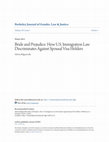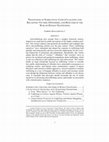Papers by Sabrina Balgamwalla

Berkeley Journal of Gender Law Justice, 2014
Each year, several thousand women immigrate to the United States in their capacity as spouses, on... more Each year, several thousand women immigrate to the United States in their capacity as spouses, only to find their rights compromised by the constraints of their visa status. When a wife enters the United States on a dependent spouse visa, she enters at the wish of her husband. Until the day she is eligible for a green card, her dependent immigration status allows her husband to control her ability to live in the United States and all rights that stem from that status. The inherent power differential within these relationships resembles those experienced by married women generations earlier, who relinquished control of their legal personhood under the laws of coverture. The mechanism of coverture, which extinguished a married woman's independent identity in the eyes of the law, had far-reaching effects, including giving a male head of household the right to determine his family's domicile. In spite of reforms that have attempted to address antiquated gender norms and make immigration laws "gender neutral," most spousal immigrants are still female, and the historical precedent of coverture remains evident in U.S. immigration laws affecting the family, including dependent spouse visa provisions.
SSRN Electronic Journal, 2000

SSRN Electronic Journal, 2000
Anti-trafficking laws emerge from a complex historical context, shaped in no small part by public... more Anti-trafficking laws emerge from a complex historical context, shaped in no small part by public perception of this highly complex problem. This Article explores and questions the headlines and examples that drove anti-trafficking reforms over the past century. These "trafficking narratives" have stimulated and shaped the response to trafficking both globally and domestically and have powerful implications for the evolving framework of protection and punishment. Specifically, this Article argues that the roles of "victims," "offenders," and "rescuers" serve as proxies for racialized and gendered assumptions about trafficking, which in turn are reflected in anti-trafficking law and enforcement. This Article builds on legal scholarship focused on trafficking victims to consider how public understanding of offenders have unintended consequences in rendering victims-and indeed, entire communities-suspect. It argues that these stark narratives further aggressive, carceral responses to human trafficking as a way of bringing offenders to justice and rescuing victims even though the distinction between victims and offenders is not always clear. It concludes that advocates should reconsider the use of victim narratives in advancing anti-trafficking causes, particularly in association with criminal justice responses.
BIO: Sara Ibrahim, a JD candidate at the Washington College of Law, covers human rights issues in... more BIO: Sara Ibrahim, a JD candidate at the Washington College of Law, covers human rights issues in the Middle East for the Human Rights Brief. ... Patricia Staible, a JD candidate at the Washington College of Law, covers human rights issues in Africa for the Human Rights Brief.











Uploads
Papers by Sabrina Balgamwalla